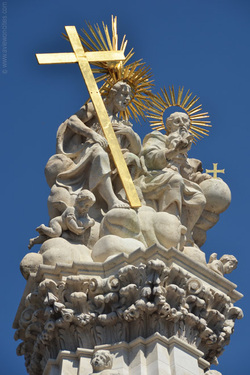 Top of a church in Budapest
Top of a church in Budapest The first concerns my earliest spiritual experience at the age of three. Ilka, our nanny, walked up the broad steps of the Greek Orthodox Church in Budapest, on the shore of the Danube one Easter Sunday. She was carrying my small brother Hugo in one arm and leading me by the other. The crowd on the porch made way for the young woman with two small children. Soon she wormed her way through the dense congregation, up to the railings separating the altar from the nave.
A stately, white-haired, white-bearded man was facing us. He was standing in front of the flower-bedecked altar in a shaft of sunlight, amid white clouds of incense and the light from the flickering wax candles in huge silver candlesticks. A tall mitre encrusted with precious stones crowned his head, above black bushy brows and large grey eyes. He was robed in sumptuous vestments of white and gold brocade, and was attended by richly dressed priests in white brocade holding lighted candles. There he stood at the very centre of the Easter splendour. He waited for the rich, massive sound of the organ and the sound of hundreds of voices singing ‘Alleluyah’ to cease, then he raised his hand to give the Easter Blessing.
Never having been anywhere like this before, I was overwhelmed. I tugged at Ilka's skirt; pointing at the Archimandrite with his raised arm.
“Ilka,” I asked, “is that man God?”
She put her index finger on her pursed-up lips and said, “Hush.”
Thus the image of God imprinted on my mind, is that of a handsome, benign, white-haired, white-bearded father, not unlike those symbols of the Godhead depicted by the old masters of the renaissance.
A few months after this incident, in 1891, the family left for Fiume on the bay of Quarnere at the uppermost tip of the Adriatic. My father was to be in charge of the construction works of the new harbour; a big contract that my grandfather secured from the Government. So the next thing I remember is a terrifying incident that happened in Fiume, on the very first day of our arrival.
Ilka took me for a walk. Suddenly I stopped and refused to move. I was transfixed at the sight of a savage-looking dark-skinned man, standing in a chemist’s doorway. He had black hair, black mostaccio, and a black beard; his flashing white teeth looked threatening under a Cossacks huge fur cap. He was shooting with a Flit gun at large cockroaches flying around his head.
I loosened myself from Ilka's grip and wanted to run for my life, but I was unable to move and stood there shaking with fear.
“Don’t be frightened, my pet,” said Ilka. “It is not a real man but only a card-board advertisement stuck to the glass door.”
To look at the figureheads on the prows of the old-fashioned sailing-boats in the harbour was a constant delight to me. Those fantastic heads, crudely carved and painted with gaudy colours, were strangely alive and expressive. They fascinated me. I could stand there gazing at them forever. There were a great many, and each one was different. A Blackamoor and a bearded, turbaned Turk carved in wood stared at me with an evil countenance. One I liked particularly was a baby-faced sailor boy, wearing a yellow straw hat with streamers and a navy blouse, his big, blue painted eyes ever fixed on some distant non-existent shore. A ferocious wild beast glared at me with yellow glass eyes from the prow of another boat, showing huge fangs in an everlasting snarl.
I was frightened. Ilka, noticing this, pulled me quickly to the next schooner, the ‘Flora’, to look at a handsome blonde, smiling serenely and garlanded with flowers, having one shapely bosom bare, the other only just covered by wooden daisies, marigolds, and roses. Here I felt at home and happy.
“That's Auntie Irma!” I said.
 RSS Feed
RSS Feed